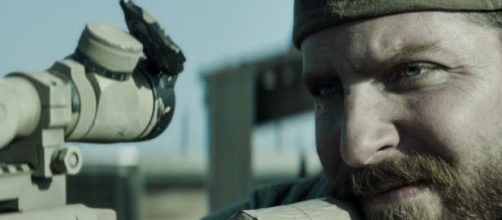Clint Eastwood'sAmerican Sniper has caused quite a political storm in recent weeks.The Oscar nominated film sits at the top of the box office for thesecond week running, amassing over $200 million. It is based on thelife of former Navy SEAL, Chris Kyle, who allegedly accumulated thelargest recorded kill tally in U.S history for a sniper. Thoseassociated with the film have rebuked any suggestions that it has apolitical spin to it, but the furore that has ensued between bothends of the political spectrum, tells another tale.
Bradley Cooperencapsulates the all American-Texan patriot to full effect in hisportrayal of Chris Kyle, who died in 2013 after being killed by afellow veteran.
The film opens in shocking fashion, as we view from the scope of hisrifle, the sight of a young woman handing a grenade to a young littleboy. After some hesitation, he eliminates the female target, followed by the child. This female turned out to be his firstkill as a sniper, but according to Kyle's memoirs, there was no childan the scene at all. The purpose of the child in the film was toaccentuate the barbarous and inhumane nature of the enemy at hand,purely for dramatic effect. Such inaccuracies in a film arecommonplace, but in the grand scheme of things, they providesubstance to those that are opposed to what this film purportedlystands for.
This is a film thatclearly polarises opinion, a film that quite possibly splits Americainto two thought systems.
To many, this is a story of a true Americanhero, who put his life at risk for the sake of his country. Itappears to show the internal gridlock of a soldier at war, the moralcrisis that lingers in the mind long after the dust has settled. Wesee Kyle at home with his family after returning from tour, clearly troubled with what he has experienced. Despite this, he is always yearningto return to the battlefield, much to the dismay of his wife. Andyet, it is not his blood thirsting desire to accumulate more killsthat come to the fore, but his inane need to protect his country andhis family. So staunch are the supporters of this film, a myriad ofRepublican figures have had their say, including Sarah Palin, whosaid that the critics were “spitting on the graves of freedomfighters who allow you to do what you do".
Kyle's memoirs show him to have less regard for the killings he wasresponsible for than the film suggests. Critics of this filmwill point to this quote from Kyle: “If you see anyone from aboutsixteen to sixty-five and they're male, shoot 'em. Kill every maleyou see. That wasn't the official language, but that was the idea”.Such nonchalant talk of killing men at sight doesn't fit the profileof a hero, though this kind of language is not expressed in the filmitself which further detracts from the general authenticity of Kyle'sportrayal. Anti-war liberalists have argued that the film serves aspropaganda, in that the 9/11 attacks legitimised the invasion ofIraq, and that the portrayal of all Iraqis in this film are nothingbut “savage”, the very term Kyle coined for them.
Michael Mooreremarked that “Snipers aren't heroes... We were taught snipers werecowards”, a sentiment that no doubt is shared by many a Call of Dutyplayer. Whether or not you are in favour of the deeds of Chris Kyle,it is worth noting that he revelled in his deadly occupation; “Iloved what I did, I still do... I'm not lying or exaggerating to sayit was fun”.

